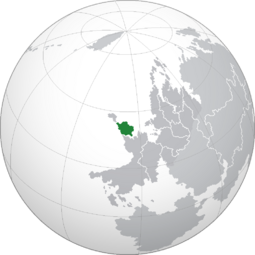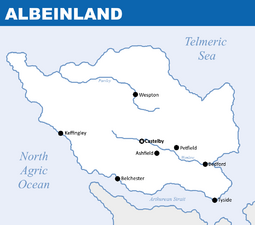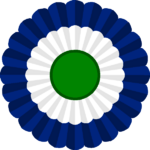Albeinland
This article is incomplete because it is pending further input from participants, or it is a work-in-progress by one author. Please comment on this article's talk page to share your input, comments and questions. Note: To contribute to this article, you may need to seek help from the author(s) of this page. |
Commonwealth of Albeinland | |
|---|---|
| Motto: Domine, dirige nos (Cambran) "O Lord, direct us" | |
| Anthem: Battle Hymn of the Republic
| |
 Albeinland (green) in Berea (grey) | |
 Political map of Albeinland | |
| Capital and largest city | |
| Ethnic groups (2020) | 87.9% White 7.2% Black 3.3% Pamiran 2.2% Mixed 0.1% Other |
| Religion (2020) | 88.2% Semitarism -74.9% Cambran sect -12.5% Nordic sect -0.8% Erytheian sect 7.3% Irreligious 4.1% Iqlad 0.4% Other |
| Demonym(s) | Albish |
| Government | Federal parliamentary republic |
| George Owen | |
| Vincent Lloyd | |
| Legislature | General Assembly |
| State Council | |
| House of Commons | |
| Establishment | |
| 10 May 1583 | |
| 13 November 1786 | |
• BDTA | 17 June 1944 |
| Area | |
• Total | 182,054 km2 (70,291 sq mi) |
• Water (%) | 0.6 |
| Population | |
• 2020 census | 6,472,318 |
• Density | 35.5/km2 (91.9/sq mi) |
| GDP (nominal) | 2020 estimate |
• Total | |
• Per capita | |
| Gini (2020) | low |
| HDI (2020) | very high |
| Currency | Sterling (ALB, £) |
| Time zone | UTC+1 (Albish Central Time) |
| Calling code | +16 |
| Internet TLD | .ab |
Albeinland, officially the Commonwealth of Albeinland, is an insular country located on the continent of Beria, sharing a maritime boundary with Sileria to the northwest and having a coastline on the Arthurean Strait to the south, the Telmeric Sea to the north and the North Agric Ocean to the southwest. With 6,472,318 inhabitants and 182,054 km² (70,291 sq mi), Albeinland is one of the smallest countries of the world.
The current Albish territory is populated since the Paleolithic era, with the first Foranic peoples migrating to the region in the 5th century BCE. The island would be annexed by the Cambran Empire years later in 85 CE, becoming an important trade hub due to its strategic location in northwestern Beria. After the fall of the Cambran Empire, Albeinland would fracture itself into various petty kingdoms and tribes, leaving the area open for a series of intensive Cuthish immigrations in the 3rd and 4th centuries. The Cuthish population consolidated themselves as the new regional elite, with a series of merchant republics, market guilds and college towns being established. The fragility of these states led the creation of the Albish League at the end of the 9th century, leading to total domination over trade routes in the Telmeric Sea and Agric Ocean.
After the Albish defeat at the First Cutho-Albish War in 1582, a series of nationalist movements overthrew the previous maritime republics and unified them into the Commonwealth of Albeinland, the first republic of its kind. The Commonwealth saw the expansion of trade activities outside Beria with the creation of outposts in Pamira and Capthora, and established one of the first colonial empires of Aurorum. Internal disputes led to the end of the republic and the establishment of an monarchy in 1732, with the 18th century being known as a golden era as the country was at the centre of most philosophic and scientific discussions of the period. However, further political instability led to the Albish Spring in 1786, with a democratic republican government taking place.
The 1800s were marked by extensive colonial expansion and industrialization. Albeinland was one of the major combatants of the Great War, with its navy seeing action in every corner of the world. The end of the war led to the independence of former colonies, with decolonization happening gradually over the century. After the end of the Melasian Crisis, Albeinland was one of the founder-states, alongside Mascylla and Lavaria, of the Berean Defence Treaty Association, standing against the Mageiros League and the Perekovka Program in the Cold War. The country was severely hit in the general crisis of 1986, having been recovered since then.
Today, Albeinland is a developed country with a high-income economy, being regarded as one of the main colonial empires in history and having its language and culture present on every continent. Its capital and primate city is Castelby. The political framework is operated under a federal parliamentary republic with the Lord-Protector being the head of state while the Prime Minister is the head of government, and has as its national legislature the bicameral General Assembly, which has as its lower house the House of Commons and upper house the State Council. Given the nature of its political system, many specialists consider Albeinland to be a crowned republic. Currently, Albeinland is a member of the Assembly of Nations and the Berean Defence Treaty Association among other international organizations.
Etymology
History
Geography
Climate
Environment
Politics
Government
Albeinland is a federal parliamentary republic, with the Lord-Protector being the head of state and the Prime Minister the head of government, having the executive composed by the lord-protector, the prime minister and the Cabinet. The Albish political system is operated under the Common Charter, which is the semi-codified constitution that, alongside other documents, treaties and conventions, sets the directives of the executive, legislative and judiciary.
The lord-protector is the national sovereign, being elected by the General Assembly after the death or resignation of the previous holder of the office, assuming the position for the entire lifetime. Despite most of them being ceremonial, it's the responsibility of the lord-protector to convoke general elections after being asked by the prime minister, appoint or dismiss the new government, represent the country on the world stage among others. The lord-protector is also the commander-in-chief of the armed forces and is expected to act as non-partisan. Given its nature, many specialists see the office as the same of a monarch.
The prime minister is responsible for lead the cabinet, which has its members drawn from the parliament, in a primus inter pares system, generally being the leader of the party with the majority of seats in the Assembly. The prime minister needs parliamentary accountability to govern and must resign or declare new elections if such accountability is lost.
The General Assembly is the bicameral national legislature, having as the lower house the House of Commons and upper house the State Council. The House of Commons is the most important house of parliament, being composed by 209 MPs elected through a first-past-the-post system for a renewable term of five years, while the State Council is composed by 25 unelected members for an unlimited term of office to represent the regions on a federal scale.
As an electoral democracy, Albeinland has a strong two-party system, with the centre-right United Conservative Party (UPC) and centre-left Progressive Republican League (PRL) alternating power since 1921. Other parties that have minor representation in politics are the Liberal Democratic Union, Green Party, Reform Party and the Free Radical Group.






